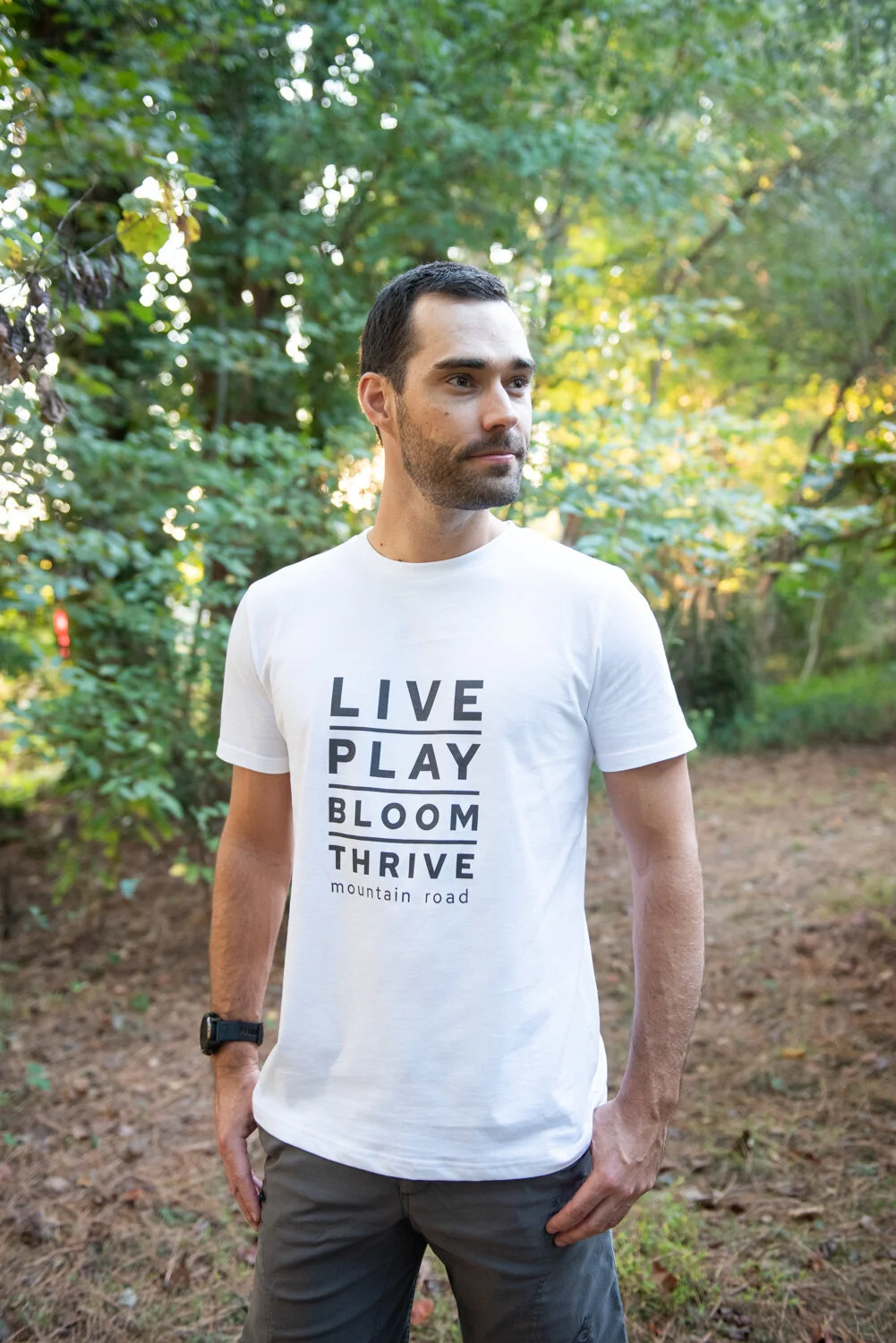Natural & Fair Trade Clothing... AND an Exciting Announcement!
Disclaimer: This post contains affiliate links, through which we earn a commission.
Lately I’ve been focusing a lot on finding clothes made from natural materials. I spend so much time thinking about what's going into my body through food, beverages, skincare and cleaning products, but I hadn't spent a lot of time considering the fabric constantly touching my highly absorbent skin. Much of the clothing found in the average American shopping mall is made from synthetic materials. Because they’re artificial, they’re not great for the environment, and they’re not great for our bodies. Fabrics like spandex, polyester, rayon and nylon are either made from synthetic materials or are coated in toxic chemicals. Additionally, clothing is often treated with toxic chemicals like formaldehyde to decrease wrinkles. Think about those dress shirts that claim they don't require ironing. How can that happen, other than through a heavy chemical spray? In addition to "wrinkle-free," watch out for other terms like "waterproof" and "stain resistant." And purchasing clothes that require dry cleaning should also be avoided, as the dry cleaning process requires toxic chemicals. Bamboo fabric may sound all natural and sustainable, but think about it: bamboo is a very hard surface. It's wood after all, and great for products like cutting boards or furniture. But the process to turn bamboo from hard wood into soft fabric is bad for the environment, and toxic for our skin. Additionally, while the term "recycled" usually connotes a positive process of repurposing, keep in mind that recycled polyester is still toxic, maybe even more so than those made from first generation polyester. It's also important to note that whenever clothing made from synthetic fabric is washed in a washing machine, millions of microfibers are shed into the water, which eventually makes its way to water sources like rivers and oceans, to be consumed by ocean life and eventually, by humans!
All the clothing in this cozy outfit come from Pact! I think I’ll be living in these 100% organic sweats all winter long!
What can be done to avoid toxins in clothing? Just like with purchasing food at the grocery store, it’s so important that we check labels! Linen, hemp, silk, alpaca and cashmere are all natural options, though I've found that cotton and wool are a lot easier to access. And take note that merino wool is softer than standard wool. Corduroy, denim and flannel that are made from 100% cotton are usually a safe option. It’s also best to select cotton that is made from organic rather than conventional processes, because it will be free of pesticides, and it will actually be better for the environment, as organic cotton requires way less water than conventional.
It's also important to consider the materials that you are sleeping on or even drying yourself off with when you come out of the shower. As is discussed in a previous blog post all about avoiding toxins in your mattress, we purchased an Avocado Green Mattress and pillows, and have been really happy with them. In terms of sheets and blankets, fleece should be avoided, while organic cotton is a great option. We have been gifted cotton sheets and blankets, so that's what we use. And towels are commonly already made from 100% cotton, so we were set there. But earlier this year, I gave Wiehan two bath towels from Boll & Branch in the stone color, and he loves them! The company also sells bedding and they use 100% organic cotton, while also practicing fair trade principles. The same goes for Pact, a clothing company that now also offers bedding and bath products.
Other than the materials from which an item of clothing is made, it's important to consider how and where the clothing is made. In our current time, there are workers around the globe who are living and working in harsh and inhumane conditions, so that companies can sell products as cheaply as possible to consumers, and still make big bucks in the end. The True Cost is a documentary that sheds light on the problem. It’s a huge eye opener when you start to look around at all the stuff you’ve accumulated and then wonder how it was all produced. In addition to fair trade for workers, it's also important to seek out products sourced from ethically treated animals. There's so much to consider! Fortunately, the eco-conscious fashion world has been growing in recent years, and natural and fair trade clothing is on the rise.
Keep in mind that natural and fair trade clothing is going to be more expensive than what we’ve come to expect clothing to cost over the last few decades. This is thanks to fast fashion, a movement enabled by cutting corners, with the price paid by the health and well-being of impoverished factory workers, as well as the environment. Synthetic fabrics are way faster to produce, but the manufacturing process adds toxins to the environment. Additionally, fast fashion has greatly diminished our philosophical value in clothing, while encouraging waste. The quality of fast fashion clothes is very low, meaning that they will fall apart and be sent to the trash can. But we have been trained to accept the notion of buying cheap, throwing away, and then buying cheap again. In the same way that we have to change the way in which we value food and accept the fact that healthy, nutritious and sustainably produce food will cost more than the conventional junk, we also have to change the way in which we value all other items that we purchase, asking about their environmental and humanitarian impact. As the saying goes, you get what you pay for. If you’re paying $10 for a t-shirt, don’t be surprised when the seams begin to fall apart soon after your initial purchase. However, investing a few extra dollars into your clothing might mean a more durable product, and the material will promote the individual health of the owner, as well as the health of the surrounding environment and those involved in the production process. But fortunately there are ways to access clothing made from natural materials at an affordable price.
I recently watched a video from Off Grid with Doug & Stacy in which Doug explains why he wears "Amish" clothes. He explains that the way Amish people dress is not part of their religious beliefs, but is instead just functional, called simple or plain dressing. He also says that while he's not Amish, he wants to wear clothing made only from natural fiber and he wants to support his local community with his dollar, so he commissions his Amish neighbors to make his clothing. I find this to be an incredibly powerful and positive perspective, and it really challenges me to think differently about my own consumerism practices. While our great grandparents would have followed similar community practices, we have drifted so far from this way of life that many of us wouldn't even know where to begin to find someone local who can make our clothes. Therefore, I am sharing idea for where to find natural and fair trade clothing, bedding, towels and more. Be sure to check out our video for this blog post here!
Check out our very own Mountain Road t-shirts - sustainably made from 100% organic cotton!
Where to find natural, fair trade clothing:
Learn how to sew. This is an option that I’d love to pursue, if I had fewer other hobbies and interests filling my time. While I probably won’t be making my own clothes any time soon, I do make sure to mend loose seams and patch holes wherever possible, so that we can keep wearing perfectly fine clothing as long as possible. But for those who are up to the task, sewing is becoming very fashionable again and you can find lots of inspiration and instructions assistance on YouTube, Instagram and Etsy.
Shop secondhand. The very best way to score affordable clothing is through secondhand options like thrift stores or yard sales. Every Saturday when I was growing up, my mom was up and out the door first thing in the morning to browse the items up for sale at the yard sales in our town. Oftentimes, she’d find clothing that still had the tags on them. Needless to say, the majority of my clothing was secondhand. The best part of secondhand shopping is that you can give new life to clothing that is still in good condition, while keeping it from heading to the landfill prematurely. And the hunt can be a lot of fun! Just be sure to check the tags for the fabric composition of the items; and always clean secondhand garments thoroughly before use.
You can find natural and fair trade clothing here at Mountain Road! We are so excited to launch our own t-shirts, designed by us, and made by Teemill with 100% organic cotton, produced sustainably and with fair trade practices! Click here to check it out! And after many years, when your Mountain Road t-shirt has had a good life and looks like it’s ready to be thrown out, you can actually send it back to Teemill so that they can repurpose the threads from your worn shirt - how cool is that?!
Pact - If I could own one of every item of clothing in the women's line at Pact, I would! I first learned about them nearly two years ago. Since then, I've collected a dress, 3 sports bras, 1 short sleeved black shirt, 2 long sleeved black shirts, 2 short sleeved white shirts, 1 sweatshirt, 1 pair of sweatpants, 3 camisoles, 8 pairs of socks, and two pairs of leggings as a gift from Wiehan. So I guess I'm well on my way to owning one of everything! All the clothes are so comfortable. The only downside is that many items contain elastane, which is synthetic, but it's usually only a lower percentage of 5%. The socks also contain nylon. So if you are extra sensitive to synthetic materials, watch out for the items that list elastane and nylon.
Prana - This company is highly concerned about environmental issues and sustainability. Many of their clothes contain synthetic fibers, however you can find a lot of organic cotton and some items made with hemp and wool. Be sure to check the product materials for each individual item of clothing when shopping.
Maggie's Organics - I recently learned about this company when I was gifted a pair of their cozy socks. They practice ethical business principles and their products are as natural as possible! Find out more here.
Mattress & Bedding: As discussed above, we love our Avocado Green Mattress! And Pact is a great company to check out, if you’re looking for sheets.
Towels: Pact is also a great company for organic cotton towels. And be sure to check out Boll and Branch as well. Wiehan loves his bath sheets from them!
Shoes: Earlier this year, I purchased a pair of Genesis Sandals from Xero Shoes. These shoes allow feet to move naturally in the way in which they are designed, without all the extra shoe support materials getting in the way. Find out more in this episode titled Feet First, from the Weston A. Price Wise Traditions podcast. I’ve also recently learned about Allbirds, through an episode of the podcast How I Built This. The company’s origin story is fantastic and CEOs Tim Brown & Joey Zwillinger care a whole lot about sustainability. They create shoes from merino wool, a product that is available in excess in Tim Brown’s homeland, New Zealand. Definitely worth looking into!
And there are many more companies out there. These are just the ones with which I’m familiar. If you have favorite companies that offer natural and fair trade clothing and household goods, let us know in the comments below! Not all my clothes are all-natural yet, especially not my workout or winter clothes. Overhauling my wardrobe will be a gradual process, through which I will continue to use a lot of the clothing that I already own, while consciously selecting natural and fair trade options when replacing worn garments.
- Christin
Tell us! Could you ever give up Spandex?!








